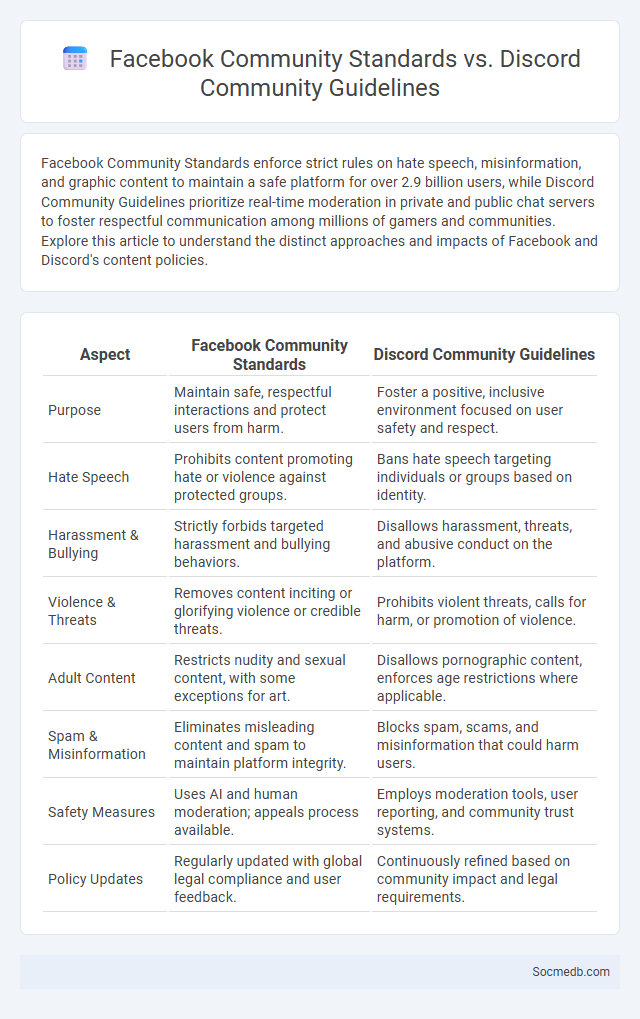
Photo illustration: Facebook Community Standards vs Discord Community Guidelines
Facebook Community Standards enforce strict rules on hate speech, misinformation, and graphic content to maintain a safe platform for over 2.9 billion users, while Discord Community Guidelines prioritize real-time moderation in private and public chat servers to foster respectful communication among millions of gamers and communities. Explore this article to understand the distinct approaches and impacts of Facebook and Discord's content policies.
Table of Comparison
| Aspect | Facebook Community Standards | Discord Community Guidelines |
|---|---|---|
| Purpose | Maintain safe, respectful interactions and protect users from harm. | Foster a positive, inclusive environment focused on user safety and respect. |
| Hate Speech | Prohibits content promoting hate or violence against protected groups. | Bans hate speech targeting individuals or groups based on identity. |
| Harassment & Bullying | Strictly forbids targeted harassment and bullying behaviors. | Disallows harassment, threats, and abusive conduct on the platform. |
| Violence & Threats | Removes content inciting or glorifying violence or credible threats. | Prohibits violent threats, calls for harm, or promotion of violence. |
| Adult Content | Restricts nudity and sexual content, with some exceptions for art. | Disallows pornographic content, enforces age restrictions where applicable. |
| Spam & Misinformation | Eliminates misleading content and spam to maintain platform integrity. | Blocks spam, scams, and misinformation that could harm users. |
| Safety Measures | Uses AI and human moderation; appeals process available. | Employs moderation tools, user reporting, and community trust systems. |
| Policy Updates | Regularly updated with global legal compliance and user feedback. | Continuously refined based on community impact and legal requirements. |
Introduction to Online Community Governance
Online community governance establishes clear rules and guidelines to maintain respectful and constructive interactions among members, ensuring a positive user experience. Effective governance frameworks involve monitoring content, enforcing policies, and facilitating conflict resolution to uphold community standards. Your active participation and adherence to these governance principles foster a safe and engaging social media environment.
Overview of Facebook Community Standards
Facebook Community Standards define the platform's guidelines to promote a safe and respectful environment for all users. These standards cover content related to hate speech, violence, harassment, misinformation, and nudity, ensuring compliance with legal and ethical norms. Regular updates to the policies incorporate feedback and address emerging challenges in the social media landscape.
Key Features of Discord Community Guidelines
Discord Community Guidelines emphasize respectful communication, strict prohibition of harassment, hate speech, and harmful content, fostering a safe and inclusive environment. The guidelines mandate users to avoid sharing explicit, violent, or illegal material while promoting privacy and data security. Enforcement includes account suspension or bans for repeated violations to maintain a positive social media experience.
What Are Generic Community Standards?
Generic community standards are a set of universal guidelines designed to maintain respectful and safe interactions on social media platforms. These standards typically prohibit hate speech, harassment, misinformation, and explicit content to foster a positive online environment. Platforms like Facebook, Twitter, and Instagram implement these rules to protect users and promote constructive communication.
Comparative Analysis: Facebook vs Discord Policies
Facebook and Discord enforce distinct content moderation policies tailored to their platforms' unique audiences, with Facebook emphasizing community standards around hate speech and misinformation, while Discord prioritizes real-time communication and private group safety. Facebook implements comprehensive data privacy controls influenced by global regulations like GDPR, contrasting with Discord's more flexible approach focused on user anonymity and decentralized moderation by server admins. Understanding these differences helps you choose the platform that aligns with your privacy preferences and communication needs.
Content Moderation Approaches
Content moderation approaches on social media platforms include automated filtering algorithms, human review teams, and community reporting systems to ensure safe and respectful interactions. AI-powered tools detect and remove harmful or inappropriate content swiftly, while human moderators evaluate nuanced or borderline cases to maintain contextual accuracy. Your online experience benefits from this multi-layered strategy, balancing efficiency and fairness in digital content oversight.
Enforcement and Reporting Mechanisms
Social media platforms implement robust enforcement and reporting mechanisms to maintain community standards and user safety, utilizing AI-driven content moderation alongside human reviewers to detect and address policy violations. Your ability to report inappropriate content promptly helps platforms respond efficiently, ensuring a safer online environment. Transparent appeal processes and clear guidelines further empower users to understand enforcement actions and protect digital interactions.
Privacy and User Protection Measures
Social media platforms implement robust privacy and user protection measures to safeguard Your personal information from unauthorized access and data breaches. Advanced encryption protocols, multi-factor authentication, and regular security audits help ensure account security and maintain user trust. Privacy settings allow You to control data visibility and manage sharing preferences for a safer online experience.
Community Impact and User Experiences
Social media platforms have transformed community impact by fostering global connections and empowering local activism that drives social change. Your participation enhances user experiences through personalized content, interactive features, and instant communication that cultivates engagement and shared understanding. These dynamic networks amplify diverse voices, making social media a vital tool for building inclusive communities and meaningful online interactions.
Future Trends in Community Guidelines
Future trends in community guidelines emphasize advanced AI integration for real-time content moderation, enhancing accuracy in detecting harmful or misleading posts while reducing false positives. Increasing transparency and user empowerment will be prioritized through clearer rules and interactive appeal systems, fostering trust between platforms and communities. Emphasis on protecting mental health and promoting digital wellbeing will drive the creation of guidelines that limit exposure to harmful content and encourage positive, inclusive interactions.
 socmedb.com
socmedb.com